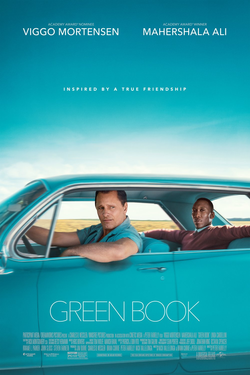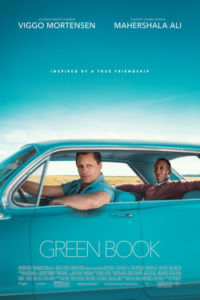

My wife and I went to see the movie Green Book and thoroughly enjoyed it. I highly recommend it.
I won’t bother recounting the story; that’s easy to find on line.
Instead I want to remark on a line in the movie. The white driver, Tony Lip, says to Dr. Don Shirley:
I like what you did back there, Doc. You stood up for yourself. It’s like your friend the President says, “Ask not your country what you could do for it, ask what you do for yourself.” You know?
Presumably we are supposed to laugh at that line. Many people at the movie, including my wife and me, did laugh.
But, whatever the screen writer’s intent with that line, it’s actually a very wise comment. Indeed, it is much better, content-wise, than the original JFK line. That line “Ask not what your country can do for you; ask what you can do for your country” was pretty horrible.
Here’s what Milton Friedman said about that line at the start of his classic Capitalism and Freedom:
In a much quoted passage in his inaugural address, President Kennedy said, “Ask not what your country can do for you — ask what you can do for your country.” It is a striking sign of the temper of our times that the controversy about this passage centered on its origin and not on its content. Neither half of the statement expresses a relation between the citizen and his government that is worthy of the ideals of free men in a free society. The paternalistic “what your country can do for you” implies that government is the patron, the citizen the ward, a view that is at odds with the free man’s belief in his own responsibility for his own destiny. The organismic, “what you can do for your country” implies that government is the master or the deity, the citizen, the servant or the votary. To the free man, the country is the collection of individuals who compose it, not something over and above them. He is proud of a common heritage and loyal to common traditions. But he regards government as a means, an instrumentality, neither a grantor of favors and gifts, nor a master or god to be blindly worshiped and served. He recognizes no national goal except as it is the consensus of the goals that the citizens severally serve. He recognizes no national purpose except as it is the consensus of the purposes for which the citizens severally strive.
But now consider the last part of Tony Lip’s formulation:
ask what you do for yourself.
So Tony is saying, possibly unwittingly but possibly wittingly, that what matters is that you look out for yourself and don’t depend on others. It’s not perfect. It doesn’t, for example, talk about people helping each other. But it’s much better than JFK’s statist formulation.

READER COMMENTS
Paul A Sand
Feb 17 2019 at 6:10am
I remember reading that passage in Capitalism and Freedom as a mushy-headed kid in the sixties. I was shocked that anyone could talk back to one of the holier passages from the canon of Saint JFK. But then … wait a minute, isn’t he right?
I’ve described this as my “come-to-Milton moment”.
David Henderson
Feb 17 2019 at 8:53am
Yes, I read that in the fall of 1968, when I was 17. I had actually never thought about the quote. He was the first person I saw actually analyzing its content. Pretty exciting moment.
The Original CC
Feb 17 2019 at 8:34am
Hilarious comment, Paul! I love it.
TMC
Feb 17 2019 at 9:29am
The original JFK quote doesn’t seem too dastardly to me. “Ask not what your country can do for you” is a good response to everyone trying to get something from the government. “ask what you can do for your country” at least puts the individual in the driver’s seat in what they are willing to offer, as opposed to those who believe the government has the right to just take what it wants. Either way, I prefer it to what today looks like. JFK would have been too conservative to run for president today.
Mark Z
Feb 17 2019 at 12:46pm
The corollary though is that I could see certain politicians arguing that, in the spirit of Kennedy’s quote, we should not gripe about paying more taxes.
David Henderson
Feb 17 2019 at 1:26pm
You’re making a good point if we take the word “ask” literally. And if you read me much, you know that I’m a literalist.
Why the exception here? Because in my experience, when governments use the word “ask,” they don’t mean “ask.” Check how often you see governments saying that they’re “asking” high-income or rich people to pay more in taxes. If they were asking, the revenues they want to raise would not be called taxes.
You could argue, quite reasonably, and you actually do argue, that this is what JFK was telling us we, not the government should ask. So your point holds up somewhat against my critique. In case you can’t tell, TMC, I’m thinking as I’m writing.
Still, when I look at all JFK’s New Frontier proposals and the spokesmen for them, I think the Friedman critique was justified.
Thaomas
Feb 17 2019 at 4:01pm
Comparing the program of JFK with that of our current President — restricting immigration even more than it was already restricted, starting trade wars, substantially increasing the structural deficit — all done in the name of what your country can do for you, asking what you can do for your country looks pretty good.
Mark Z
Feb 17 2019 at 4:11pm
But the two are in fact one and the same. Consumers are expected to suffer the effects of tariffs “for the good of the country” (manufacturers of protected goods); consumers and employers are expected to pay higher prices/wages “for the good of the country” (domestic laborers competitive with immigrants). What you’re country does for you is merely what someone else is being made to do “for their country.” Two sides of the same coin. One’s duty to an abstraction, like a nation-state, or ‘society’, or what have you, ultimately reduces to an obligatory transfer of resources from one set of individuals to another set of individuals.
Thaomas
Feb 18 2019 at 10:05am
No, in tariffs, consumers are expected to suffer a greater loss for the lesser good of workers and owners of firms in the protected industry.
Armin Chosnama
Feb 20 2019 at 3:09pm
I’ve always read it as “ask not what your government can do for you, ask what you can do for your fellow citizens.”
You always sacrifice precision for poetry.
Michael Svehla
Mar 2 2019 at 8:16am
“ talk about people helping each other “
If we can solve that problem most other problems disappeae.
Comments are closed.